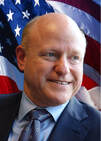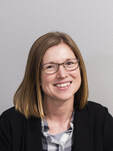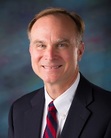Our directors have decades of experience in critical infrastructure protection.

Eric W. Burger, Director. Dr. Burger is a Research Professor at Virginia Tech’s School of Public and International Affairs. His research and teaching covers cybersecurity, distributed computing, DLT, systems economics and risk, policy, and network governance. He served on detail as Assistant Director of the White House Office of Science and Technology Policy and prior to that as the Chief Technology Officer of the Federal Communications Commission. Prior to Dr. Burger's academic career, he was CTO of several network equipment and enterprise software companies.
Richard M. Krieg, Director. Dr. Richard Krieg is Founding Editor of the Journal of Critical Infrastructure Policy based in Washington DC. The peer-reviewed Journal provides a cross-sectoral platform for critical infrastructure and community resilience. He has extensive background in the public health, healthcare and philanthropy. He is former Commissioner of Health for the City of Chicago, Associate Dean of the University of Illinois at Chicago School of Public Health and Director of Policy Analysis for the Metropolitan Chicago Healthcare Council, an association of 142 hospitals in the Greater Chicago area. He was President and CEO of The Horizon Foundation in Columbia, MD, a $100 million health philanthropy launched by Johns Hopkins University. He holds M.A. and Ph.D. degrees in Health Policy and Administration from the University of Chicago and completed the mid-career Executive Program at the Harvard Business School. His consulting activities include two FEMA-funded grants addressing the community impacts of a terrorist nuclear strike in the National Capital Region.
Mary D. Lasky, Secretary and Director. Ms. Lasky is the Chairman of the National Disaster Resilience Council (NDRC), an affiliate of FBI Infragard, and has been the Program Manager for Business Continuity Planning for the Johns Hopkins University Applied Physics Laboratory. She is lead editor and an author of Powering Through: From Fragile Infrastructure to Community Resilience, an action guide on preventing and mitigating grid failure. Ms. Lasky is a past president of the Community Emergency Response Network Inc. (CERN) in Howard County, Maryland; while she was president, CERN received two FEMA grants to research preparation for nuclear attack. She is a Past President of the Central Maryland Chapter of the Association of Contingency Planners (ACP). Previously at the Applied Physics Laboratory, Ms. Lasky has held a variety of supervisory positions in Information Technology and in business services. For many years, she was adjunct faculty of the Johns Hopkins University Whiting School of Engineering, teaching in the graduate degree program in Technical Management. Ms. Lasky is a Certified Business Continuity Professional (CBCP).

Camille J. Palmer, Director.
Dr. Camille Palmer is an Associate Professor in the School of Nuclear Science and Engineering at Oregon State University. Her professional interests emphasize international nuclear security and nonproliferation, where she enjoys collaborations with OSU’s School of Public Policy and Robotics Program. Prior to academics, she was a staff member in both the Thermonuclear Applications and Foreign and Improvised Nuclear Design groups at Los Alamos National Laboratory. She has also supported the nuclear hardness and survivability of the Minuteman III as an engineer with the Northrop Grumman Corporation. Dr. Palmer received a PhD in Nuclear and Radiological Engineering from the University of Cincinnati. She is a current member of the Institute of Nuclear Materials Management, the American Nuclear Society, and the Center for Strategic & International Studies’ Project on Nuclear Issues. During her time in academics, she has contributed to over $10M in funded research sponsored by DOE/NNSA, DOD/DTRA, NRC, DHS, and NuScale Power.
Dr. Camille Palmer is an Associate Professor in the School of Nuclear Science and Engineering at Oregon State University. Her professional interests emphasize international nuclear security and nonproliferation, where she enjoys collaborations with OSU’s School of Public Policy and Robotics Program. Prior to academics, she was a staff member in both the Thermonuclear Applications and Foreign and Improvised Nuclear Design groups at Los Alamos National Laboratory. She has also supported the nuclear hardness and survivability of the Minuteman III as an engineer with the Northrop Grumman Corporation. Dr. Palmer received a PhD in Nuclear and Radiological Engineering from the University of Cincinnati. She is a current member of the Institute of Nuclear Materials Management, the American Nuclear Society, and the Center for Strategic & International Studies’ Project on Nuclear Issues. During her time in academics, she has contributed to over $10M in funded research sponsored by DOE/NNSA, DOD/DTRA, NRC, DHS, and NuScale Power.

Thomas S. Popik, Chairman and President of the Foundation for Resilient Societies. Mr. Popik is an advocate for resilient and sustainable electric grids under both the cost-of-service and market-based models. He has appeared before the Federal Energy Regulatory Commission, the Canadian Parliament, and the legislatures of multiple U.S. states and has been quoted in the Wall Street Journal, New York Times, Bloomberg, Politico, The Economist, Reuters, Newsweek, Marketplace, and USA Today. His published work on electric grids includes articles in Foreign Affairs, "Ukraine’s Coming Electricity Crisis," and the Journal of Critical Infrastructure Policy, "The 2021 Texas Blackouts: Causes, Consequences, and Cures." Mr. Popik holds a Master of Business Administration from Harvard Business School and a Bachelor of Science in Mechanical Engineering from MIT. In his early career, Mr. Popik served as an officer in the U.S. Air Force, with a final rank of Captain. Mr. Popik was a co-founder of the Academy for Science and Design, a New Hampshire charter high school specializing in science and math instruction with a current student body of 500. Since 1991, Mr. Popik has been a principal of a market research firm he founded, Geosegment Systems Corporation. Like the other directors of Resilient Societies, he serves as an unpaid volunteer.
